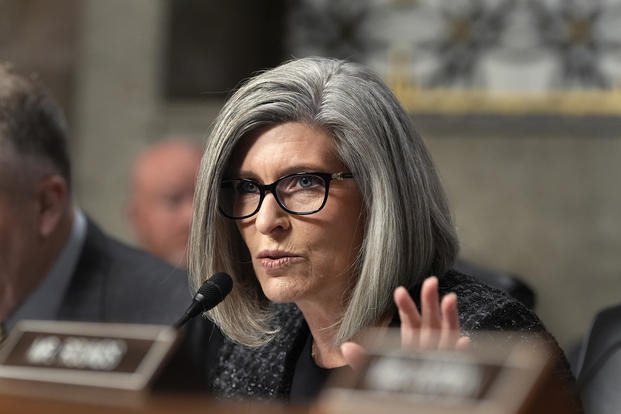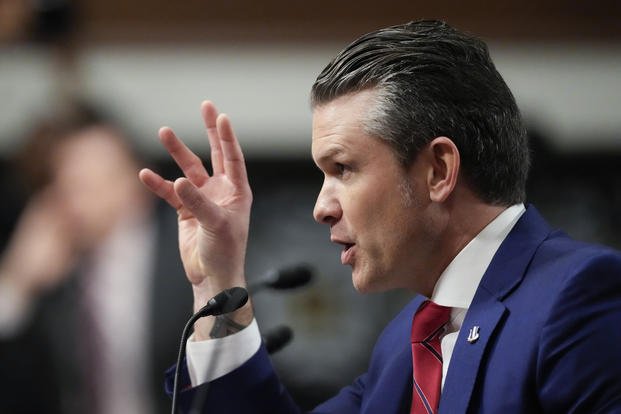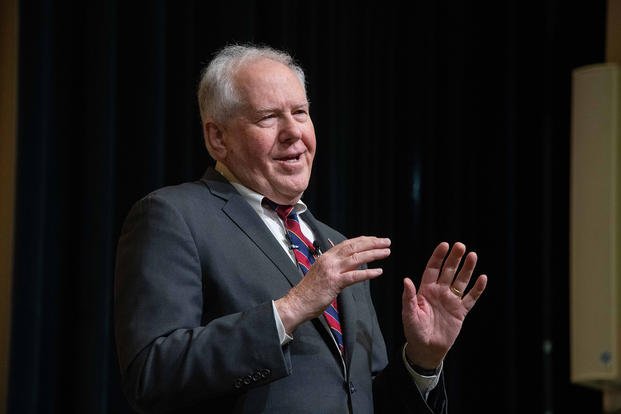Combat Veteran, Sexual Assault Survivor Senator Backs Hegseth for Defense Secretary

A key senator who had been seen as a potential barrier to Pete Hegseth's confirmation as defense secretary has come out in support of him, signaling that Hegseth is now likely on a glide path to getting approved.
In a Tuesday evening interview with a radio station[1] in her home state, followed by a written statement, Sen. Joni Ernst, R-Iowa, announced that she will vote to confirm Hegseth. Signs had been pointing in that direction, including her friendly exchange with Hegseth during his confirmation hearing hours earlier on Tuesday, but the comments made Ernst's position official and suggested any remaining hurdles to Hegseth's confirmation were falling.
"After four years of weakness in the White House, Americans deserve a strong secretary of defense," Ernst said in her written statement. "Our next commander in chief selected Pete Hegseth to serve in this role, and after our conversations, hearing from Iowans, and doing my job as a United States senator, I will support President Trump's pick for secretary of defense."
Read Next: Widow of [2]Air Force[3] Missileer Who Died of Cancer Secures [4]VA Benefits[5] After Yearslong Fight[6]
Some other Republicans seen as potential "no" votes on Hegseth, including Sens. Susan Collins of Maine and Lisa Murkowski of Alaska, still haven't explicitly stated their position on him. But Ernst's voice was considered highly influential in the debate over him, and he can still be confirmed with a couple of GOP "no" votes even if all Democrats oppose him.
Ernst became an outsized figure in the debate over Hegseth's nomination because her personal story seemed to make her an obvious foil to him. She is a female combat veteran and sexual assault survivor, while he has said women shouldn't serve in combat and has been accused of sexual assault.
When President-elect Donald Trump first announced Hegseth was his choice to lead the Pentagon, Ernst had a tepid reaction, telling reporters[7] that "he's going to have to explain" himself.
But after two closed-door meetings with Hegseth -- and an intense pressure campaign from Trump supporters that included threats of primary election challenges -- Ernst's tone began to soften. After the second meeting, she put out a statement saying she would "support Pete through this process" and that she looks "forward to a fair hearing based on truth, not anonymous sources."
The hearing happened Tuesday and was highly contentious[8] for the typically collegial Senate Armed Services Committee.
At the hearing, Ernst laid out three areas of concern she wanted Hegseth to address: getting the Pentagon to pass an audit, keeping combat jobs open to women, and preventing military sexual assault.
In response, Hegseth promised to make auditing the Pentagon a priority, said he believes women should be able to serve in combat if "the standards remain high," and vowed to appoint a senior official to oversee sexual assault prevention efforts. Hegseth did not say how that official would differ from existing positions charged with overseeing sexual assault policies, such as the under secretary of defense for personnel or the director of the Sexual Assault Prevention and Response Office.
Hegseth's assurances were enough for Ernst.
"As I serve on the Armed Services Committee, I will work with Pete to create the most lethal fighting force and hold him to his commitments of auditing the Pentagon, ensuring opportunity for women in combat while maintaining high standards, and selecting a senior official to address and prevent sexual assault in the ranks," she said in her statement Tuesday evening.
Another senator who also expressed early skepticism of Hegseth, Sen. Lindsey Graham, R-S.C., also released a supportive statement after Tuesday's hearing.
When allegations first surfaced that Hegseth had committed sexual assault, as well as mismanaged funding at two conservative veterans organizations and had a history of excessive drinking, Graham called the allegations "very disturbing."
But after a closed-door meeting with Hegseth, Graham dismissed allegations based on "anonymous sources" and told "Meet the Press" that he was "in a good place with Pete."
In his statement after Tuesday's hearing, Graham, who does not sit on the Armed Services Committee, commended Hegseth for doing a "very good job answering difficult questions."
"Democratic attacks were overly personal and fell flat," Graham added. "With today's performance, I believe Pete Hegseth's path to confirmation has been assured."
Hegseth needs only a simple majority to be confirmed, meaning he can lose up to three GOP senators and still be approved with Vice President-elect JD Vance casting a tie-breaking vote, assuming all Democrats vote against him. The Senate Armed Services Committee is expected to vote to advance Hegseth's nomination as soon as Monday, after which the full Senate would need to vote to confirm him.
Related: Hegseth Grilled About Women in Combat, Officer Purge in Confirmation Hearing[9]
© Copyright 2025 Military.com. All rights reserved. This article may not be republished, rebroadcast, rewritten or otherwise distributed without written permission. To reprint or license this article or any content from Military.com, please submit your request here[10].


 Laid up in the transition barracks at Joint Base San Antonio, Airman Basic Sean Conaway rested his freshly broken fibula and mulled over his future. While the injury wouldn't end his enlistment, Conaway's dream of joining Air Force Pararescue — one of
Laid up in the transition barracks at Joint Base San Antonio, Airman Basic Sean Conaway rested his freshly broken fibula and mulled over his future. While the injury wouldn't end his enlistment, Conaway's dream of joining Air Force Pararescue — one of